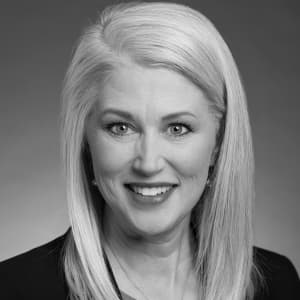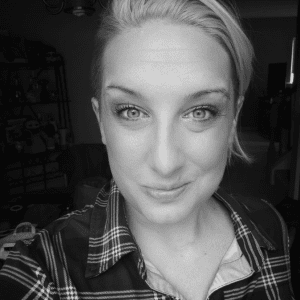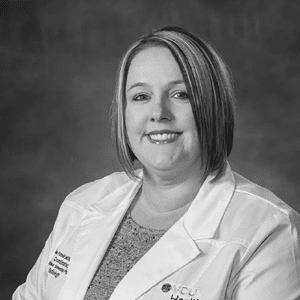Nurses Share Experiences With Cancer and Returning to Care

Melanie Bradshaw, MSN, RN; Michelle Futrell, MSN, RN; and Stephanie Gayhart, BSN, RN, are three nurse cancer survivors who share their personal nursing journeys where they shifted from being a nurse to being a patient and then back to nurse. They discuss the challenges they faced along the path starting with the first signs that led to a diagnosis and concluding with recovery and returning to the profession.
Seeing cancer from a different perspective, they have applied their vision and positive outlook to serving as advocates for others. We asked Bradshaw, Futrell, and Gayhart to share details about their experiences.
1. Please share some background information about your cancer diagnosis. How and when was it discovered?
Bradshaw
My cancer was found during an annual mammogram in July 2021. The area containing cancer cells was later measured by an MRI to be 8 x 4 x 4.5 cm. There was nothing detected during my annual mammogram 12 months prior.
Gayhart
I was diagnosed with squamous cell carcinoma of the oral tongue on August 7, 2019, after over a month of back and forth from dentists and a local ENT who swore “it can’t be cancer” because I was only 37 years old and had no risk factors.
By the time I had surgery on August 27, my cancer was stage three due to tumor size and metastasis to one lymph node ipsilateral to the tumor.
My first presenting sign that anything was wrong was a firm, mildly painful lump I noticed under my jaw, which in a week or so, I noticed was actually my tongue. The pain was so bad by the time I went in for surgery that I was taking 800 mg of ibuprofen four times daily just to talk and eat.
I never had any “typical” signs of cancer, such as weight loss, ulceration, or tissue changes on the tumor.
Futrell
In May 2018, I found a fairly sizable lump in my left breast. I scheduled an appointment with my gynecologist to get their opinion on next steps.
I was a mess that day because I was so worried. The nurse practitioner I saw did a breast exam and felt the lump, but wanted a second opinion from someone in the office. She brought in a breast fellow and reassured me that this is who I would want to do the exam and get her opinion because that was her specialty.
The fellow performed a breast exam and told me that, in her opinion, these were just age-related changes and to have my annual mammogram, as scheduled, in January 2019.
After having my mammogram, the radiologist was concerned about what she saw. She said it didn’t look like a typical cancer but wanted to err on the side of caution and do an ultrasound and biopsy.
It turned out that it was, in fact, breast cancer, and further testing confirmed that I had one lymph node that was positive for cancer as well.
All in all, I had to have three different biopsies. The initial one for the lump I felt, one for my lymph node, and a third biopsy for a spot seen on my MRI, which had to be performed under MRI guidance.
Ultimately, I was diagnosed with stage two hormone positive/HER2 negative breast cancer. I had 16 rounds of chemo, a lumpectomy, and four weeks of radiation.
2. In what ways did your nurse training influence your experience with your diagnosis, if any? Are there any aspects of being a nurse that made this experience “easier” or more difficult?
Bradshaw
As an emergency room (ER) nurse, I was used to reading radiology reports, so I actually discovered my diagnosis by reviewing my own report on my health portal days before any physician would have called me.
I called the ordering physician’s office, and she ordered follow-up tests, including a diagnostic mammogram and ultrasound, biopsy, and MRI.Having my nursing education was both a blessing and a curse. I had the knowledge necessary to know who to speak to (an oncology nurse navigator) to get the ball rolling.
While I had completed several clinical rotations at MD Anderson Cancer Center during nursing school, I wasn’t 100% familiar with the details of what my care would involve, so I immersed myself in research. I did my best to become an “expert” in all of the options available to breast cancer patients and used my ability to research to my advantage.
I learned to become my own patient advocate based on evidence-based findings and had to interview multiple doctors before finding ones that would treat me as an individual and would listen to my desires when it came to treatment.
It also helped that I was familiar with basic nursing skills and pre-op and post-op care, as I knew what to expect on the days of my surgery.However, I also felt at times that I “knew too much,” which caused my mind to race to some of the worst-case scenarios. I found that it increased my anxiety. I also felt that, as a nurse, I should be “stronger” and didn’t allow myself the grace that we encourage our patients to have with themselves.
It was very difficult to sit back and be the patient because I am so used to being in control and taking care of others.
Gayhart
My nursing background was a double-edged sword in this whole process. I knew in my gut something was very wrong, but I also didn’t want to come across as “that nurse” or “that patient,” telling the doctors what was wrong with my own body. It definitely opened my eyes to how we treat patients when we think we know more than them.
Being a nurse also prepared me when they told me I would need a hemiglossectomy and neck dissection, flap reconstruction, and temporary tracheostomy, but I think ignorance can sometimes be blissful. I panicked a lot about waking up with a trach and how that would feel.
Futrell
I often think back to my experience and wonder why, as a nurse, I didn’t advocate for myself and request to have a mammogram sooner, so that has been a bit difficult for me to work through.
There was an aspect of being a nurse that made my experience more difficult, and that was because when it came to cancer patients, I had really only ever worked with worst-case scenarios. When I was in nursing school, I worked as a patient care tech on an inpatient oncology unit and, upon graduation, worked in the emergency department. So, I didn’t really see a lot of survivors.
3. Did you experience any challenges continuing or returning to nursing after your diagnosis? If so, what were they?
Bradshaw
I had left the bedside for an education and community outreach position just three months prior to my first mammogram. That was a huge blessing in some ways. I had the ability to ease back into work more slowly, which helped in my transition from recovery back into my full-time position.
If I had still been pulling 12-hour shifts in the ER, it definitely would have taken longer and been more difficult. I had restrictions in my strength and movement for months (still recovering with physical therapy).
Gayhart
I had been a critical care bedside nurse for eight years when I was diagnosed, and because of the type of surgery and radiation treatment, coupled with an underlying degenerative neuromuscular disease (Charcot-Marie-Tooth Type 1A), I wasn’t able to return to the bedside.
I returned to work in March 2020 when the pandemic was just ramping up so I could help in any way possible “behind the scenes” and wound up doing a lot for the infection prevention department as well as giving my coworkers vaccines when they came out.
I also have post-traumatic stress disorder (PTSD) from the tracheostomy. It plugged on me one night in the hospital, and it was the scariest moment losing all control. I realized this when I went to visit a friend who was intubated, and I watched the nurse suction him. I had to walk out because I started crying and feeling panicked.
Futrell
My current position as a lung cancer screening coordinator was difficult some days because I just felt like I was surrounded by cancer, and I felt like running away sometimes. I would sit at my desk and think, “I hate cancer.” There were days I contemplated getting a new job, but in the end, decided not to make a move.
I didn’t want to run away from something because of fear. I wanted to be able to get to a place where I could be in a good headspace and not worry all the time. So I stuck it out, and I am glad I did because I think it helps when I can relate to patients on the same level when it comes to that fear.
I still have my days that the fear tries to creep in and take over, but not like it used to. My faith in God has helped me to overcome a lot of the worry and fear.
4. Do you believe your experience with cancer has influenced your ongoing approach to patient care? If so, in what ways?
Bradshaw
Absolutely! I now work in a level two trauma center where my role is focused on preventing traumatic injury and providing support to trauma survivors as they navigate recovery. After receiving over four feet of incisions myself and facing a life-threatening diagnosis, I had to deal with my own recovery, which also included some PTSD-like symptoms and a flurry of emotions. I was very blessed to have a fellow ER nurse and breast cancer survivor support me through my recovery, and I absolutely could not have done it without her. I want to provide that same kind of peer support to our trauma patients and have been passionate about developing a program for them.
I felt like I was compassionate before my diagnosis and treatment, but I’m even more so now.
Gayhart
Absolutely. First, we need to trust our patients more and anticipate their needs. Had I not been overlooked multiple times before getting the scan that showed the mass, I may have avoided getting to stage three before surgery.
Also, I didn’t have the best hospital stay. No one turned me despite me having been on my back in the operating room for over 12 hours, intubated, and sedated overnight before getting to my room the next day.
I wasn’t able to turn myself because I had a wound vacuum-assisted closure on my left arm from the flap harvest, four drains around my arm and neck, the trach, a nasogastric tube, an A-line in my right arm, and intravenous lines.
I wound up with a stage-one sacral wound that took forever to heal because obviously nutrition was very difficult for a while. Before my trach plugged, I kept telling my nurses something felt wrong, and I couldn’t breathe right. They listened to my lungs, said I was fine, and that was that.
On Labor Day, the night shift had a party (which I totally understand and support), but I could hear them. When I called for my pain med at night, no one came for over an hour, and I had to call again, which made me feel like a bother. But I was also in a lot of pain and wanted to sleep.
We need to be mindful of things like that, and despite our work being hard and deserving time to relax, our patients should always come first. We are there to serve them, to help them heal. Even the biggest pain-in-the butt patient is a human being and deserves the same treatment as the nicest patient.
My motto, even before cancer when I was bummed to be working a holiday, was, “I get to go home after 12 hours; the patient doesn’t.”
Futrell
Yes! When I talk with patients about possible follow-up testing they need to have after their screening, and they express their worry/anxiety, it hits me in my heart in a way that it never had before because it takes me back to the agonizing feeling waiting for the results for the several biopsies I had to have (two breast/one lymph node).
I often share my story with them so they know that I really do understand.
5. Do you have any tips or suggestions for nurses on staying up to date with regular exams and screenings while balancing a busy work life?
Bradshaw
As nurses, we tend to spend our careers so focused on taking care of others (not just our patients but our family and friends as well). It is imperative that we take care of ourselves … like they say on airplanes, “put on your oxygen mask before assisting others with their masks.”
I have been committed to my cancer screenings my entire life, but I’ve sacrificed my health countless times and have always put myself at the end of the line when it comes to care (self-care).
I have had to make a shift in putting myself first and advocating for my own mental and physical health needs — something I wasn’t quick to do before.
Gayhart
It’s hard. I’m still behind on certain screenings, honestly. I am a single mom, have the ongoing side effects from radiation and surgery, work full time (now as a registered nurse educator), and I’m in grad school online.
However, I think we need to realize that if we don’t take care of our own health first and foremost, we will lose the ability to do all of those things we do in daily life, including caring for others.
The only way I’ve found to actually keep up with it all is to schedule it in so it’s a part of my routine. I also think it would be great if healthcare employers offered more screenings and wellness events for their employees, knowing most work odd hours which makes it more difficult to get to appointments.
Futrell
If you feel something, say something, and advocate for yourself! Make the time! If I had gone for my mammogram in May 2018 after the first visit, it may not have spread to my lymph nodes.
Meet Our Contributors

Melanie Bradshaw is a registered nurse who lives in the Houston, Texas area. She holds a bachelor’s degree in speech communication and a master’s degree in nursing leadership and management. The majority of her nursing career has been at the bedside, in labor and delivery and emergency nursing. Bradshaw now works at a level 2 trauma center in community outreach and education, where she provides trauma survivors with support during their recovery.

Stephanie Gayhart is a nurse educator and student at the Ohio State University College of Nursing’s Master in Healthcare Innovation program. After eight years working at the bedside in critical care, she was diagnosed with stage III oral squamous cell carcinoma of the tongue and underwent radical surgery and radiation in 2019.
Gayhart volunteers for the National Coalition for Cancer Survivorship Cancer Policy and Advocacy Team, participates in the Ulman Foundation GameChangers program, and runs a Facebook group for young adult cancer survivors. She is also a volunteer for The Young Tongues, an online support group for young adults affected by tongue cancer.

Michelle Futrell has been a nurse for 13 years and currently works as the lung cancer coordinator at the VCU Health System and Massey Cancer Center in Richmond, Virginia. In her role as coordinator, she manages the operations for the lung screening program and navigates patients through the screening process. Futrell has nursing experience in the emergency department and as an administrative supervisor.
She earned a dual degree (MSN/MBA) from Grand Canyon University and a BSN from South University. Futrell is also a certified emergency nurse.